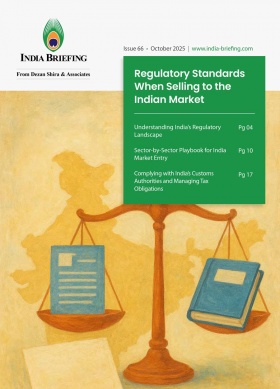Forensic Accounting in India: Fraud Prevention and Risk Management for Businesses
Modern businesses operate within increasingly complex financial ecosystems, making fraud prevention and investigative clarity more critical than ever. Forensic accounting now plays a strategic role in enhancing governance, managing risk, and ensuring resilient operations, especially as India’s digital economy expands and cyber-enabled misconduct rises.
Organizations globally deal with increasingly complex financial systems and rising incidents of fraud, in which forensic accounting has become a critical tool for strengthening financial integrity. It supports risk management, enhances transparency, and helps organizations stay compliant and resilient.
As India’s digital economy grows, several of its niche sectors, such as e-commerce and technology, depend on forensic specialists to trace cyber-enabled fraud, misuse of online payments, and manipulation of digital financial records.
Types of forensic accounting
Forensic accounting covers a wide range of investigative activities, each aligned to specific kinds of financial misconduct. While methods differ depending on the nature of the fraud, several types of forensic accounting engagements are commonly encountered.
Financial theft
Financial theft may be committed by employees, vendors, customers, or external parties. Although basic irregularities may surface during routine audits, forensic accountants carry out deeper examinations to identify how the fraud occurred, quantify the loss, and gather supporting evidence.
Securities fraud
Securities fraud involves manipulation or misrepresentation related to stocks or investments. This includes insider trading and misconduct by brokers, traders, or even corporations. Such cases frequently lead to litigation and public scrutiny, requiring forensic experts to trace transactions and reconstruct events.
Bankruptcy examination
When companies declare bankruptcy, forensic accountants analyze financial records to understand the sequence of events that led to insolvency. They verify whether the submitted statements are accurate and evaluate if any misrepresentation or fraudulent activity contributed to the bankruptcy.
Loan default and debt recovery
In cases where borrowers default, forensic accountants help identify assets or financial trails that can be used to recover outstanding dues. Their findings support lenders in evaluating recovery strategies or initiating legal action.
Assessment of economic damages
If an organization suffers financial loss due to misconduct or malpractice, forensic accountants investigate the incident, estimate the impact, and assist in recovering losses through litigation or negotiation.
Mergers and acquisitions (M&A)
During M&A transactions, acquiring companies rely on forensic accountants to assess the true financial health of a target company. They examine valuations, returns, liabilities, and undisclosed risks. If disputes arise, forensic professionals provide evidence of misrepresentation or fraud.
Tax fraud or evasion
Individuals and businesses may attempt to avoid taxes by concealing income or assets. Forensic accountants review financial records to identify inconsistencies, uncover hidden income, and determine whether fraudulent reporting has occurred.
Corporate valuation disputes
Misrepresenting a company’s value, through manipulated financial statements or misleading disclosures, can deceive investors or buyers. Forensic accountants analyze records, identify inflated valuations, and determine the company’s true financial position.
Professional negligence claims
When a professional’s negligence allegedly causes financial loss, forensic accountants evaluate financial data to confirm whether the claimed damages are legitimate and quantify the actual loss suffered.
Money laundering investigations
Forensic accountants trace suspicious financial transactions to detect the movement of illicit funds. They identify how unlawful money enters legitimate systems and track its origin and end use.
Breach of financial or data privacy
Unauthorized access or misuse of confidential financial information can significantly harm individuals or organizations. Forensic accountants investigate data breaches, identify the source, and assess the extent of the compromise.
Forensic accounting in India: Emerging trends
Forensic accounting is becoming increasingly important within India’s evolving business and regulatory landscape. As financial operations grow more digitized and interconnected, it is now central to safeguarding business integrity and responding to the rising risks associated with sophisticated financial and digital crimes.
A clear shift is evident in the nature of forensic work. Cyber-related financial fraud has accelerated with the expansion of digital payments and online financial services, prompting forensic accountants to adopt advanced tools such as data analytics, artificial intelligence (AI) driven pattern recognition, and blockchain tracing to identify and reconstruct fraudulent transactions. At the same time, stricter regulatory frameworks, including goods and services tax (GST), Prevention of Money Laundering Act (PMLA), and sector-specific compliance requirements, have increased scrutiny on financial reporting. Forensic experts now support businesses in detecting irregularities, strengthening internal controls, and ensuring adherence to these regulatory obligations.
Corporate governance has also become a priority for both regulators and investors. Forensic accounting contributes to improved governance by identifying lapses, preventing financial misstatements, and promoting greater accountability across management and operational functions.
CLICK HERE: Managing Financial Risks: A How-to Guide for Businesses in India
FAIS in India: Key principles and engagement classifications
In 2023, the Institute of Chartered Accountants of India (ICAI) introduced the world’s first Forensic Accounting and Investigation Standards (FAIS) to enhance the reliability of digital financial reporting. the move also aims to promote forensic accounting guidelines for their global adoption, positioning India as a leader in AI-enabled accounting and forensic practices.
FAIS 110 (“Nature of Engagement”) sets out the foundational principles that forensic professionals must follow before beginning any assignment. The standard requires practitioners to clearly define the scope, objectives, and expected outcomes of the engagement.
The standard also classifies engagements into three distinct categories:
- Forensic accounting engagement, focused on examining financial information using forensic accounting techniques.
- Investigation engagement, aimed at fact-finding related to suspected misconduct, fraud, or irregularity.
- Litigation support engagement, performed to assist legal proceedings, including expert reports or testimony.
FAIS 110 emphasizes that these engagements are not the same as audits, and the standards are not applicable to statutory audit assignments. This distinction is crucial because audit engagements are governed by the Standards on Auditing (SAs), where auditors provide an independent opinion on financial statements— something outside the scope of forensic assignments.
Please note that the FAIS 110 applies to forensic accounting and investigation professionals, not to statutory auditors.
Common scenarios treated as investigation engagements
FAIS 110 provides guidance on determining when an assignment should be treated as an investigation. Below are examples of mandates where the nature of the work aligns with an investigation, making FAIS applicable:
Procurement irregularities
Examining suspected fraud or unusual patterns in the purchase of raw materials. Corroborating findings with potentially suspicious behavior by procurement staff.
Whistleblower allegations
Reviewing complaints against the Procurement Head or other employees relating to inflated raw material prices or kickback payments for awarding business
Loan defaults and fund misutilization
Assessing whether a borrower has diverted or misused loan proceeds. This also includes tracing fund flow to detect unauthorized transactions.
Employee or corporate fraud
Employee theft, securities fraud, identity theft, falsified financial information, or insurance-related fraud. Any examination involving internal misconduct requiring forensic analysis.
Misappropriation and manipulation in listed companies
Investigating diversion, siphoning, or concealment of assets or earnings. Identifying schemes designed to manipulate financial reporting or influence stock prices.
Market abuse and trading manipulation
Analyzing synchronized or coordinated trades suspected to manipulate share prices. Reviewing potential front-running or churning activities by portfolio managers or intermediaries.
Industry-wide scope of forensic accounting in India
Forensic accounting has become a critical tool for investors and businesses operating in India, offering both preventive safeguards and investigative support across key sectors. In the corporate environment, it plays a central role in uncovering embezzlement, fund diversion, asset misuse, and financial misstatements. It also strengthens the integrity of mergers, acquisitions, and other strategic transactions through detailed forensic due diligence that helps confirm a target’s true financial position and detect hidden liabilities.
Within the banking and financial services sector, forensic accountants help institutions identify money laundering activities, loan-related fraud, and internal misconduct. Their expertise also contributes to improved internal controls and more robust fraud-risk frameworks.
The legal system increasingly relies on forensic accountants as expert witnesses who provide technical analysis and evidence in litigation, arbitration, and regulatory proceedings. Their work is instrumental in settling commercial disputes, shareholder disagreements, and family business conflicts. In the insurance industry, forensic accounting helps validate the authenticity of claims, investigate inflated or fabricated losses, and detect structured fraud schemes.
Healthcare organizations benefit from forensic interventions that expose fraudulent billing, kickback arrangements, and misreported operational data. Non-profit organizations (NGOs) similarly rely on forensic accountants to ensure transparent use of donor funds and to detect any instances of misappropriation or diversion.
Challenges in India’s forensic accounting landscape
The practice of forensic accounting in India face several operational, regulatory, and capability-building challenges. One of the most persistent issues is the limited awareness among organisations about when and how forensic accounting should be applied. Many companies still view forensic reviews as a reactive exercise, initiated only after a fraud has surfaced, rather than a strategic tool for prevention, governance enhancement, and risk monitoring. This reactive approach often leads to delayed detection, larger financial losses, and weakened internal control systems.
Another challenge lies in the acute shortage of skilled forensic professionals equipped to handle modern financial crimes. The rise of cyber-enabled fraud, digital payment misuse, and complex money-laundering structures has increased the demand for expertise in advanced analytics, blockchain tracing, and digital forensics.
However, India’s talent pool in these niche areas remains limited. This skills gap often results in extended investigation timelines, dependence on external specialists, and inconsistent quality of forensic engagements.
Business advisory tips for strengthening forensic preparedness
To navigate these challenges, businesses and investors can adopt several proactive measures to strengthen fraud resilience and enhance governance:
1. Treat forensic accounting as a preventive strategy, not merely an investigative tool. Periodic forensic reviews—especially in high-risk functions like procurement, treasury, and sales, help detect anomalies early and reinforce ethical conduct.
2. Invest in digital fraud detection capabilities. Deploy tools such as continuous transaction monitoring, data analytics dashboards, and automated red-flag identification. These systems create real-time visibility over financial operations and reduce dependency on manual checks.
3. Strengthen internal controls and documentation practices. Companies should integrate forensic considerations into internal audits, compliance frameworks, and standard operating procedures (SOPs). Clear record-keeping and auditable trails significantly improve the speed and accuracy of forensic investigations.
4. Build a skilled forensic response ecosystem. This includes training internal teams, partnering with accredited forensic professionals, and accessing expertise in areas like cybersecurity, e-discovery, and blockchain analysis.
5. Implement robust whistleblower and fraud-reporting mechanisms. Anonymous reporting channels encourage early disclosure of misconduct and provide valuable leads for proactive investigations.
6. Conduct forensic due diligence in all major transactions. Whether in M&A, vendor onboarding, joint ventures, or large funding rounds, forensic due diligence helps identify hidden liabilities, inflated valuations, and compliance risks that traditional financial due diligence may overlook.
7. Align business practices with FAIS and global forensic standards. Adhering to forensic standards, such as ICAI’s FAIS, helps companies demonstrate good governance, improves the credibility of investigations, and ensures that reports hold up in regulatory or legal proceedings.
8. Prepare for multi-jurisdictional compliance. Companies with cross-border operations should map legal requirements relating to data privacy, reporting obligations, and evidence handling to avoid delays or complications during forensic engagement.
About Us
India Briefing is one of five regional publications under the Asia Briefing brand. It is supported by Dezan Shira & Associates, a pan-Asia, multi-disciplinary professional services firm that assists foreign investors throughout Asia, including through offices in Delhi, Mumbai, and Bengaluru in India. Dezan Shira & Associates also maintains offices or has alliance partners assisting foreign investors in China, Hong Kong SAR, Vietnam, Indonesia, Singapore, Malaysia, Mongolia, Dubai (UAE), Japan, South Korea, Nepal, The Philippines, Sri Lanka, Thailand, Italy, Germany, Bangladesh, Australia, United States, and United Kingdom and Ireland.
For a complimentary subscription to India Briefing’s content products, please click here. For support with establishing a business in India or for assistance in analyzing and entering markets, please contact the firm at india@dezshira.com or visit our website at www.dezshira.com.
- Previous Article Kerala Introduces India’s First Right to Disconnect Legislation: All You Need to Know
- Next Article India Expands Export Controls with New SCOMET Category 7 for Emerging Technologies












